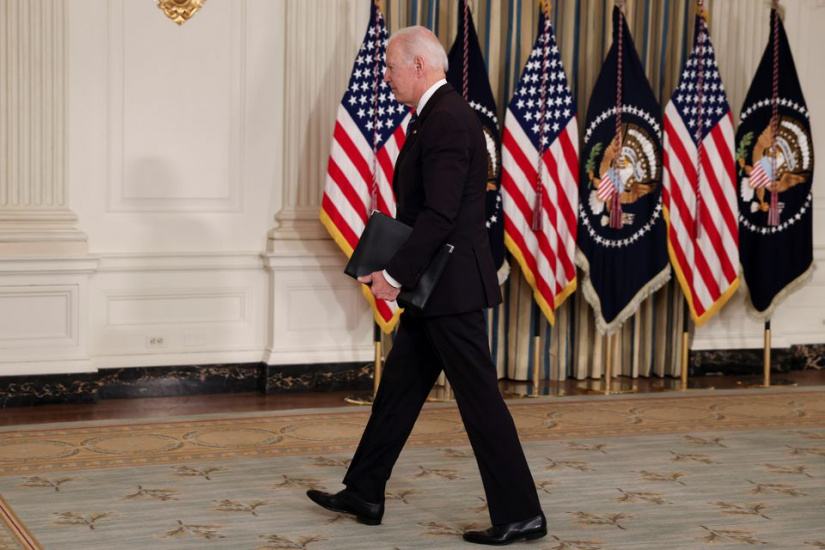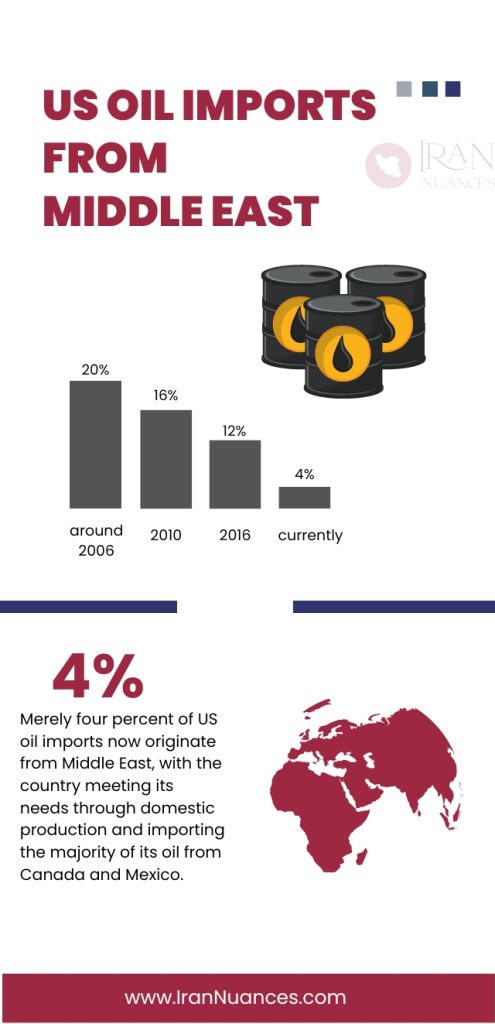How Iran can benefit as US disengages from Middle East

Lately, the apparent decline of American involvement in the Middle East, alternatively known as West Asia, has been a subject of intense conjecture. A myriad of factors have been posited to explain the United States’ gradual disengagement from this turbulent region. These include:
- The draining, protracted conflicts the United States waged in the Middle East and the ensuing animosity towards Americans
- The unfulfilled objectives in Afghanistan and Iraq
- Decreased reliance on Middle Eastern oil
- A strategic pivot by the United States towards Asia, particularly China
This analysis does not seek to contest or confirm such assertions, but rather, sheds light on another facet of this trend: the dwindling proportion of Middle Eastern oil imported by the United States in recent years. Reports indicate that merely four percent of US oil imports now originate from this region, arguably the most salient factor behind the waning focus on the Middle East. Consequently, the region’s allure for the United States has faded considerably compared to previous decades. A brief examination of US oil policies from 2006 to the present reveals the following trends:
- In 2006, more than 20% of US oil imports were sourced from the Middle East
- In 2010, this proportion dwindled to nearly 16%
- By 2016, it further dropped to approximately 12%
- Currently the figure hovers at just four percent
As these statistics demonstrate, the Middle East’s significance for the United States has steadily diminished. The US now primarily meets its oil requirements through domestic production and shale oil, while also importing the majority of its oil from neighboring Canada and Mexico, which boast lower transportation costs. Intriguingly, even in Iraq, which was invaded by the United States in 2003, China has now overtaken the US as the primary buyer of Iraqi oil. Moreover, Saudi Arabia has ranked only fourth or fifth among US oil suppliers in recent years.
Over the past five decades, two issues have consistently underpinned the Middle East’s appeal for the United States: oil and Israel. Now that the region’s oil supply to the US has dwindled, the sole remaining concern is Israel’s security. The United States seeks to offset its diminished regional presence by providing extensive military aid to its ally.
In stark contrast to the decline in American oil purchases from Middle Eastern nations, China has emerged as their top customer. This development offers a key to understanding China’s gradual ascendancy in the region, as its energy security hinges predominantly on Middle Eastern resources. As a result, it is only logical for China to assume a greater role in mitigating regional tensions and managing crises, as stability is indispensable for securing its energy supply.
The waning American attention towards the Middle East does not align with European interests. Europe’s security is inherently linked with that of the Middle East, due in large part to geographical proximity. Additionally, Europe has historically delegated responsibility for its security to the United States. Furthermore, the Middle East remains a vital source of energy for Europe. Consequently, the ebbing US presence in the region is a source of consternation for many Europeans. The AUKUS security accord, forged between Australia, the United States, and the United Kingdom hastened chagrin from numerous European nations, notably France, which has characterized the arrangement as an Anglo-Saxon-centric undertaking that disregards the sensibilities of other European states. The Quadrilateral Security Dialogue (QSD), commonly known as the Quad, which includes India, Japan, the United States and Australia is another case in point. These perspectives are substantiated by the omission of European interests from the agreement’s broader objectives, as they focus on countering China and converging on Asia without attending to the Middle East. Conceivably, the United States might be content with India’s prominence in the Middle East, given their alignment on certain interests and the Indian influence in the region.

Should the ongoing attenuation of American dependency on Middle Eastern energy persist, the United States may become increasingly autonomous from this volatile region. Consequently, one can appreciate the mounting anxieties of Arab states that have long relied on American security guarantees and support. Recent actions by Saudi Arabia and the United Arab Emirates seemingly contravening the American stance underscore this concern.
The relative insouciance of the United States vis-à-vis the conduct of Saudi Arabia and the UAE in recent years lends credence to the notion that Washington’s expectations of these allies have shifted; as long as their policies neither contradict nor hinder American interests, their performance are afforded lower priority. This strategic recalibration can be traced back to 2008 when then-President Barack Obama declared that American interests necessitated a shift in focus from the Middle East to Asia and China. This policy has persisted through the Trump administration and into the current Biden tenure, with little prospect of alteration in the near term.
Amid this evolving geopolitical landscape, where does Iran find itself? In principle, the withdrawal of the United States from the region presents opportunities for Iran, which should strive to capitalize on this realignment. However, Iran’s capacity to reap full advantage is hampered by ongoing stringent sanctions imposed by the West, led by the United States.
For Iran to optimally exploit the changing context, it must strive to reach a resolution with the West. Failure to address and resolve these issues may not necessarily precipitate a dire predicament or confrontation, but the continued suspension of their resolution would primarily be to Iran’s detriment. Under the shadow of crippling Western sanctions, Iran’s maneuverability is progressively compromised, rendering it more vulnerable in several spheres including economics, and increasingly reliant on major powers such as Russia and China. Subsequently, this reliance may gradually erode Iran’s strategic autonomy and vision.
Assuredly, were the tensions with the West to be alleviated, China would stand as Iran’s foremost partner across all domains, as Iran occupies a unique geopolitical position and is instrumental in fulfilling China’s interests. However, it is crucial for Iran to engage as a nation unburdened by economic pressures so that it may secure its interests more effectively. The nuclear issue should not be viewed in isolation as Iran’s sole point of contention with the West. The two parties’ disagreements are far more extensive, and constraining them to the nuclear ambit may be a calculated ploy by the West to retain control over Iran while allowing Israel greater latitude to act against Iranian interests. To truly seize emerging opportunities, it is imperative for Iran to resolve its differences with the West expeditiously.
Source: Iran Nuances

